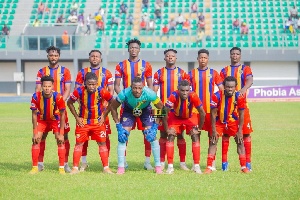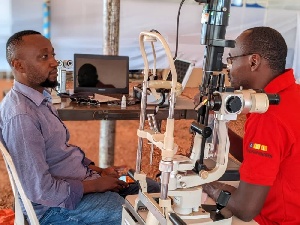- Home - Entertainment
- Lifestyle News
- Year In Review
- Music News
- Entertainers
- Entertainment Archive
- Entertainment Photos
- Jokes
- Entertainment Headlines
- Ameyaw Debrah
- Brown GH
- Celebrities Buzz
- GH Base
- Ghana Celebrities
- Gh Gossip
- GH Page
- GH Splash
- Hot Gossip GH
- YEN
Music of Thursday, 15 May 2025
Source: www.ghanawebbers.com
Beyond TGMA's Vibe: Ghana's Wave of Talent Ready for Grammy Recognition
Ghanaian musicians often express a desire to "put their country on the map." For many, winning a Grammy Award is the ultimate goal. This ambition comes from a rich musical heritage and a wish to connect with audiences at home and abroad.
With the 26th Telecel Ghana Music Awards (TGMA) now over, it’s time to reflect on Ghana's music industry. We can consider what it takes for artists to achieve Grammy-winning success.
The Diversity of Ghanaian Music
Ghana has a vibrant music scene full of energy. Highlife is at its core, an upbeat genre that started in the early 20th century. It blends traditional Ghanaian melodies with Western jazz and swing influences.
Highlife became the soundtrack for a nation seeking identity and remains vital today. In the 1990s, Hiplife emerged as a mix of Highlife and hip-hop, led by pioneers like Reggie Rockstone. Hiplife gave voice to youth, addressing social issues while blending modern and traditional styles.
Today, Afrobeats dominates globally, with Ghanaian musicians playing key roles in its spread. While Nigerian artists like Burna Boy and Wizkid are well-known, Ghanaian artists are also rising. They collaborate with international stars and earn global accolades.
Black Sherif exemplifies this trend; his blend of drill and Highlife has gained him fame. Afrobeats continues to resonate worldwide with catchy hooks and feel-good vibes.
Who Could Bring Home a Grammy?
Popularity alone doesn’t guarantee Grammy success. Key factors include creativity, international appeal, production quality, and cross-cultural collaborations.
Few Ghanaian artists have achieved commercial success both locally and globally. Their lyrical talent, versatility, and extensive catalogs have built loyal fan bases worldwide. International collaborations expand their reach while maintaining high-quality music positions them as contenders.
This raises an important question: among talented lyricists with impressive catalogs, who will capture the Recording Academy’s attention?
Afrobeats and Dancehall artists have gained rapid international recognition through electrifying performances. Their provocative lyrics and genre-blending styles enhance their profiles through global touring.
Stonebwoy consistently releases award-winning Dancehall albums that meet high production standards. Among these dynamic performers, who will most impress Grammy voters?
We should also consider artists who maintain strong connections with fans despite less visibility abroad. Collaborations like Shatta Wale’s “Already” with Beyoncé have boosted global recognition for some artists.
Sarkodie showcases technical excellence through high-quality production and profound lyrics in English and Twi. Several Ghanaians stand out as hopefuls by blending eclectic styles while nurturing devoted fanbases.
Talents like Kuami Eugene, Efya, and Gyakie are gaining international traction quickly due to their powerful vocals. These artists must continue pushing creative boundaries while building global connections.
King Promise recently stated that "the Grammy is the ultimate validation." He believes it shows that Ghanaian music belongs on the global stage.
What the Grammys Are Looking For
The Grammy Awards focus on more than just record sales; they recognize artistic excellence too. The Recording Academy values innovation, technical skill, cultural impact, cross-genre appeal, and international attention in music submissions.
One relevant category is Best Global Music Album which celebrates diverse genres outside the U.S., reflecting global diversity effectively.
However, critics argue that African music often faces underrepresentation or miscategorization at the Grammys. Despite this concern, the Recording Academy aims to spotlight exceptional music from around the world.
The Challenges Artists Face
Ghanaian artists face several barriers on their path to Grammy success:
- Limited access to world-class studios
- Weak distribution networks
- Insufficient funding for international promotion
A report from GHAMRO highlights improvements in production quality but notes many independent artists still lack access to top facilities.
Global visibility remains challenging for those without major label support or media backing. There’s ongoing debate about how "World Music" or "Global Music" categories represent African music's depth accurately.
Recently introduced categories like Best African Music Performance show progress toward inclusivity within awards structures.
Recording Academy CEO Harvey Mason Jr emphasized that "music is about inclusivity." He believes excluding certain genres undermines creativity's essence but stresses preserving diverse musical traditions' integrity is crucial too.
Why Aren’t There More Ghanaian Grammy Winners?
Despite immense talent in Ghana's music scene, few have won Grammys due to various reasons:
- The industry has historically favored Western perspectives.
- Financial investment for large-scale promotion is lacking.
- Language barriers can hinder international appeal.
- The competition at the Grammys is fierce globally.
A well-known producer noted that financial constraints limit many talented individuals' ability to compete internationally despite having skills needed for success.
Ghana’s Grammy Horizon: Building Momentum
Ghana's dynamic music scene continues evolving positively through events like TGMA which help boost artist exposure significantly.
Data from MUSIGA indicates professional recording artist numbers have steadily increased over recent years—reflecting growth within this industry sector overall.
If Ghanaian musicians keep raising creative standards while forging partnerships globally—their chances of achieving Grammy recognition will improve significantly over time.
When Ghanaian music secures its place on an international stage—it represents not only victory for individual artists but also celebrates African culture's richness worldwide where it truly belongs!











